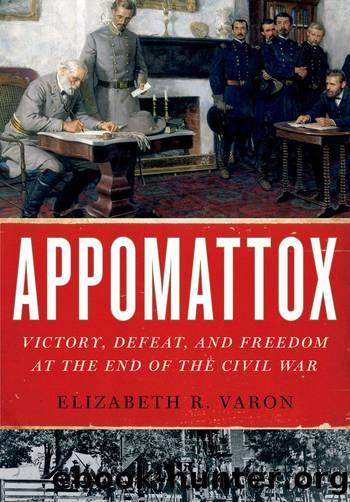Appomattox by Varon Elizabeth R.;

Author:Varon, Elizabeth R.;
Language: eng
Format: epub
Publisher: Oxford University Press, Incorporated
Published: 2014-11-14T16:00:00+00:00
When it came to assessing the surrender terms, unanimity among Confederates on the home front broke down. Some were hopeful that the terms would be the blueprint for a soft peace. For example, John B. Jones, a clerk in the Secretary of Warâs office in Richmond, speculated on April 11 that âfrom the tone of the leading Northern papers, we have reason to believe President Lincoln will call Congress together, and proclaim an amnesty.â For many, the restoration of the Union on any termsâeven one premised on Northern respect for Lee and his armyâwas simply unacceptable. While they attributed great dignity to Lee, Confederate civilians felt robbed by defeat of their own dignity. Their diaries and letters testify to the deep sense of humiliation they felt upon hearing of the surrender. Diarist Cornelia Peake McDonald, a refugee in Lexington, Virginia, wrote of how she and her family absorbed the news from Appomattox: âGrief and despair took possession of my heart, with a sense of humiliation that till then I did not know I could feel. The distress of the children was as great as mine; their poor little faces showed all the grief and shame that was in their hearts, and each went about sad and dejected as if it was a personal matter.â As refugees and soldiers streamed back into the city, she observed that some were âhappy at the thought of being released from danger, hunger, and weariness.â âBy far the greatest number, however,â she added, âseemed to regard peace as a dire misfortune.â Eliza Rhea Anderson Fain of East Tennessee watched as paroled soldiers returned to her home state in late April; a group of them left with her family a copy of Leeâs Farewell Address, prompting Fain to observe in her diary that the noble Confederates were âoverpowered but not defeated,⦠might for the time overpowering right.â The soldiersâ reports that they had been âtreated respectfully by the Yankees since the surrenderâ could not dispel Fainâs âfearful foreboding of evilâ and her sense that the South could never again âlink her political destinyâ to the North.10
Confederate civilians were, on the whole, more distrustful than Confederate soldiers were of Grantâs motives and intentions. Many regarded the conciliatory surrender terms as a transparent bid to lure Southerners into accepting renewed subjugation. Emma LeConte of Columbia, South Carolina, a fervent Confederate with a keen intellect and acid pen, wrote in her diary in late April, âI used to dream about peace, to pray for it, but this is worse than war. What is such peace to us?⦠It is too horrible. What I most fear is a conciliatory policy from the North, that they will offer to let us come back as before. Oh no, no!⦠Let them oppress and tyrannize, but let us take no favors of them.â Sarah Fowler Morgan Dawson, who produced a massive diary of life in wartime Baton Rouge and New Orleans, was equally defiant. She learned of Leeâs surrender on April 13. To
Download
This site does not store any files on its server. We only index and link to content provided by other sites. Please contact the content providers to delete copyright contents if any and email us, we'll remove relevant links or contents immediately.
The Dawn of Everything by David Graeber & David Wengrow(1567)
The Bomber Mafia by Malcolm Gladwell(1519)
Facing the Mountain by Daniel James Brown(1428)
Submerged Prehistory by Benjamin Jonathan; & Clive Bonsall & Catriona Pickard & Anders Fischer(1375)
Tip Top by Bill James(1291)
Wandering in Strange Lands by Morgan Jerkins(1281)
Evil Geniuses: The Unmaking of America: A Recent History by Kurt Andersen(1269)
Red Roulette : An Insider's Story of Wealth, Power, Corruption, and Vengeance in Today's China (9781982156176) by Shum Desmond(1267)
The Way of Fire and Ice: The Living Tradition of Norse Paganism by Ryan Smith(1258)
Driving While Brown: Sheriff Joe Arpaio Versus the Latino Resistance by Terry Greene Sterling & Jude Joffe-Block(1230)
American Kompromat by Craig Unger(1213)
F*cking History by The Captain(1196)
It Was All a Lie by Stuart Stevens;(1191)
American Dreams by Unknown(1153)
Treasure Islands: Tax Havens and the Men who Stole the World by Nicholas Shaxson(1151)
Evil Geniuses by Kurt Andersen(1142)
White House Inc. by Dan Alexander(1122)
The First Conspiracy by Brad Meltzer & Josh Mensch(1075)
The Fifteen Biggest Lies about the Economy: And Everything Else the Right Doesn't Want You to Know about Taxes, Jobs, and Corporate America by Joshua Holland(1029)
